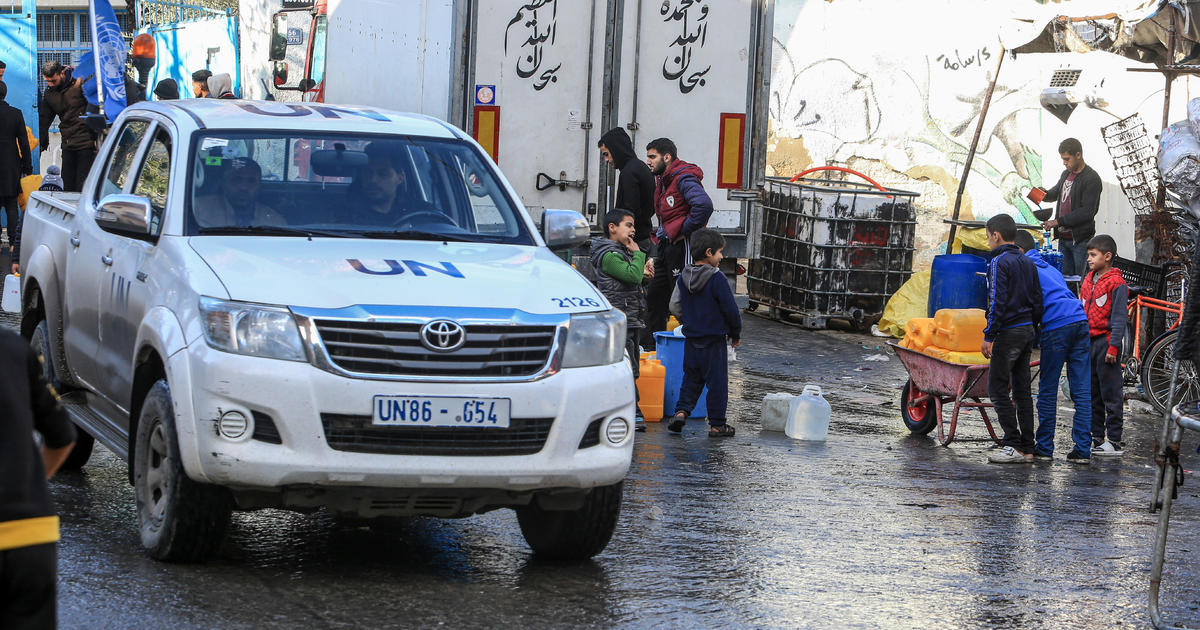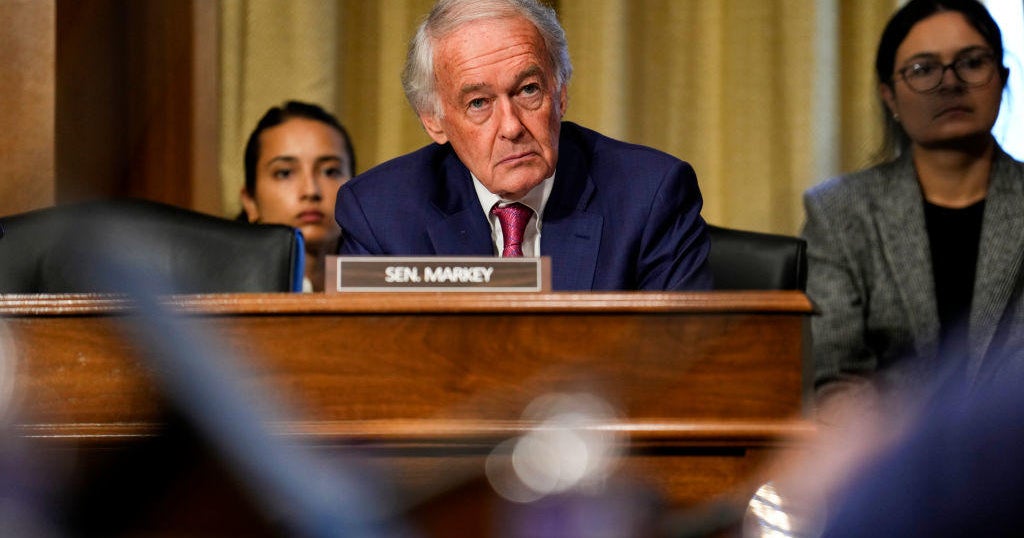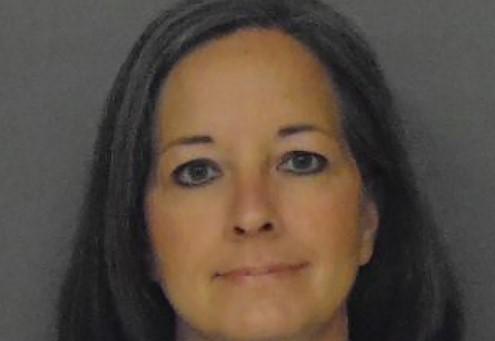CBS News
Israeli intelligence docs detail alleged UNRWA staff links to Hamas, including 12 accused in Oct. 7 attack

Tel Aviv, Israel — An Israeli intelligence document shared on Monday with CBS News and a number of other Western news outlets spells out allegations against a dozen U.N. employees whom Israel says participated in Hamas’ Oct. 7 terror attack. The document claims seven staff members of UNRWA, the U.N. humanitarian agency that helps Palestinian refugees, stormed into Israeli territory during that attack, including two who participated in kidnappings.
The allegations against UNRWA staffers prompted the U.S. and some other Western countries to freeze funds vital to the work of the agency, which is a lifeline for desperate Palestinians in war-torn Gaza. The U.N. fired nine of the 12 accused workers and condemned “the abhorrent alleged acts” of staff members.
The accusations come after years of tensions between Israel and UNRWA over its work in Gaza, where it employs roughly 13,000 people.
U.S., other nations pause UNRWA funding
Despite the humanitarian catastrophe unfolding in the besieged territory — where Israel’s war against Hamas has displaced the vast majority of the population and officials say a quarter of Palestinians are starving — major donors, including the U.S. and Britain, have temporarily suspended funding. On Monday, Japan and Austria joined them in pausing assistance.
Abed Rahim Khatib/Anadolu/Getty
With the majority of its budget in doubt, UNRWA said it would be forced to halt operations within weeks if funding isn’t restored.
The threat to the U.N. agency came as Israel said cease-fire talks held Sunday in Paris, which CIA chief William Burns took part in, along with his Israeli counterpart and senior representatives from Egypt and Qatar, were constructive but that “significant gaps” remained in any potential agreement.
The talks are meant to bring about some respite in war-torn Gaza and to secure the release of the more than 130 hostages still believed to be held in the territory.
Fighting continued, further complicating assistance to war-weary people in Gaza. Israel issued an evacuation order to residents in the western part of Gaza City, urging them to head south. The order indicated that battles are still being waged in northern Gaza, an area Israel pummeled in the first weeks of the war and where it had previously said it held military control.
Israel’s offensive in Gaza has killed more than 26,000 Palestinians, most of them women and minors, according to the Health Ministry in the Hamas-ruled enclave. The ministry does not distinguish between civilian and combatant deaths in its tally.
The war has also threatened to set off a wider regional conflict, with the U.S. announcing three of its troops killed in a strike blamed on Iran-backed militias in Jordan over the weekend.
Details of allegations against UNRWA staff in Gaza
The Israeli document, which has been shared with U.S. officials and obtained by CBS News Monday, lists 12 people, their alleged roles in the attack, job descriptions and photos.
The document says intelligence shows that at least 190 UNRWA workers were also working as Hamas or Islamic Jihad operatives, without providing evidence. It says of the 12 workers, nine were teachers and one a social worker. Seven of the employees were accused of crossing into Israel on Oct. 7. Of those, two were alleged to have kidnapped or assisted in the abduction of Israelis and another two were said to have participated in raids on communal farming villages, according to the document.
One was accused of arming himself with an anti-tank missile the night before the attack, while the document claimed another took photos of a female hostage.
Some were accused of “participating in a terror activity” or coordinating the movement of trucks or weapons used in the attack. Ten were listed as having ties to Hamas and one to the Islamic Jihad militant group.
The names and photos of the accused workers could not immediately be verified. Two of the 12 have been killed, according to the document. The U.N. previously said one was still being identified.
UNRWA’s funding, mandate, and tension with Israel
The allegations have stoked longstanding tensions between Israel and UNRWA. Israel says Hamas uses the agency’s facilities to store weapons or launch attacks from. UNRWA says it does not knowingly tolerate such behavior and has internal safeguards to prevent abuses and discipline any wrongdoing.
The agency’s commissioner, Philippe Lazzarini, recently announced that he was ordering an external review of the agency’s operations and its safeguards.
Israel has long been critical of the agency and accuses it of helping to perpetuate the 76-year-old Palestinian refugee crisis.
Jonathan Conricus, a former spokesperson for the Israel Defense Forces who is now a senior fellow at the The Foundation for Defense of Democracies thinktank in the U.S., told CBS News correspondent Pamela Falk on Monday that he believes UNRWA is “an obstacle to peace and a corrupt organization that facilitates the continued rule of Hamas over Gaza and its terrorist activities against Israel.”
He said the agency had “no future, and should be responsibly phased out, for the benefit of Palestinians and Israelis.”
UNRWA says it cares for the vast needs of millions of Palestinians across the Middle East that have been sharply exacerbated by the latest war.
OMAR EL-QATTAA/AFP/Getty
U.N. Secretary-General Antonio Guterres called for the donors to resume funding on Sunday, and said UNRWA should not be penalized over the alleged actions of the dozen workers.
The United States, the agency’s largest donor, cut funding over the weekend, followed by several other countries. Together, they provided more than 60% of UNRWA’s budget in 2022.
UNRWA provides basic services for Palestinian families who fled or were driven out of what is now Israel during the 1948 war surrounding the country’s creation. The refugees and their descendants are the majority of Gaza’s population.
Since the war began, most of the territory’s 2.3 million people depend on the agency’s programs for “sheer survival,” including food and shelter, Lazzarini said.
A quarter of Gaza’s population is facing starvation as fighting and Israeli restrictions hinder the delivery of aid, which has been well below the daily average of 500 trucks before the war.
Communications Director Juliette Touma warned that the agency would be forced to stop its support in Gaza by the end of February.
CBS News
Group of Senate Democrats demands action on unfulfilled vehicle safety measures

Nine Senate Democrats sent an urgent letter Wednesday imploring the nation’s top auto safety regulator to “accelerate the implementation” of several potentially lifesaving vehicle safety measures called for in the 2021 Infrastructure Investment and Jobs Act, commonly referred to as the bipartisan infrastructure bill.
Among the outstanding provisions was an order from Congress that the National Highway Traffic Safety Administration draft a new standard for the strength of vehicle seats — a measure prompted by a long-running CBS News investigation.
“The agency must still finalize some of its proposed rules and has not yet issued rules for many provisions — rules that are already overdue or nearing their statutory deadline,” the senators wrote in the letter.
Sens. Ed Markey, Richard Blumenthal, Ben Ray Lujan, Elizabeth Warren, Amy Klobuchar, Dick Durbin, Jack Reed, Ron Wyden and Chris Van Hollen sent the letter to NHTSA Deputy Administrator Sophie Shulman asking for response by Dec 15.
The NHTSA does not currently have an administrator to head the agency, a post that has been vacant for most of the last two administrations.
Since 2015, CBS News reports have brought to light longstanding concerns over seatback safety and exposed dire weaknesses within the federal standard, which was created in 1967. The probe found that front seats in vehicles were vulnerable to collapsing in crashes in which those vehicles had been rear-ended, even though the seat construction adhered to national requirements.
NHTSA was given two years to develop new safety standards for seat strength, primarily in an effort to protect children sitting in the back seats of vehicles. Fatal incidents in which front seats collapsed backward in rear-end accidents, and onto kids seated behind them, had already been on the rise for years.
NHTSA missed the deadline, but in July, it announced its plans to potentially update that safety standard. While it sought public comments, the agency has not announced further action.
“It’s unacceptable that backseat passengers – especially children – are still at risk of being killed by a collapsing front seat during a crash,” Markey said in a statement. “After Senator Blumenthal and I passed our Modernizing Seatback Safety Act, and doggedly urged NHTSA to act, I was glad the agency finally issued its proposed rule updating seatback safety standards. But our work is not done yet, and NHTSA must quickly finalize this rule and save lives.”
Kayla Bartkowski/The Boston Globe via Getty Images
Other outstanding safety provisions the senators are seeking status reports on include an annual recall completion list, automatic shutoff for vehicles with keyless ignition systems, setting minimum standards for crash avoidance systems, distracted driver reduction research, updates to hood and bumper standards, a study of existing reporting requirements for vehicle manufacturers regarding potential safety issues, requirements for new vehicles to be equipped with advanced impaired driving prevention technology and a requirement aimed at reducing the likelihood a child is left in a hot car by equipping new vehicles with a system to alert the driver to check rear seats.
CBS News
Susan Smith seeking her freedom 30 years after drowning her 2 young sons in a car in a South Carolina lake

Columbia, S.C. — Susan Smith, the South Carolina mother convicted of killing her two sons by rolling her car into a lake in 1994 with the boys strapped in their seats inside, will ask a parole board for her freedom on Wednesday.
Smith, 53, is serving a life sentence after a jury convicted her of murder but decided not to sentence her to death. Under state law at the time, she is eligible for a parole hearing every two years now that she has spent 30 years behind bars.
South Carolina Department of Corrections via AP
Smith will make her case for freedom to the seven-member parole board by video link from prison. Then she will go offline and her ex-husband and father of the children, as well as the prosecutor at her murder trial, will argue that she remain incarcerated.
Smith killed 3-year-old Michael and 14-month-old Alex because a man she was having an affair with suggested the boys were the reason they didn’t have a future together, prosecutors said.
A decision to grant parole requires a two-thirds vote of board members present at the hearing, according to the state Department of Probation, Parole and Pardon Services. Parole in South Carolina is granted only about 8% of the time and is less likely with an inmate’s first appearance before the board, in notorious cases or when prosecutors and the families of victims are opposed.
How the case unfolded
Smith made international headlines in October 1994 when she said she was carjacked late at night near the city of Union and that a man drove away with her sons inside. Smith, who is white, said the carjacker was Black.
For nine days, Smith made numerous and sometimes tearful pleas asking that Michael and Alex be returned safely. The whole time, the boys were in Smith’s car at the bottom of nearby John D. Long Lake, authorities said.
MARY ANN CHASTAIN / AP
Investigators said Smith’s story didn’t add up. Carjackers usually just want a vehicle, so investigators asked why would they let Smith out but not her kids. The traffic light where Smith said she had stopped when her car was taken would only be red if another car was waiting to cross, and Smith said no other cars were around. Other bits and pieces of the story didn’t make sense.
Smith ultimately confessed to letting her car roll down a boat ramp and into the lake. A re-creation by investigators showed it took six minutes for the Mazda to dip below the surface, while cameras inside the vehicle showed water pouring in through the vents and steadily rising. The boys’ bodies were found dangling upside-down in their car seats, one tiny hand pressed against a window,
Prosecutors said Smith was having an affair with the wealthy son of the owner of the business she worked at. He broke it off because she had the two young sons.
Lou Krasky / AP
Smith’s lawyers said she was remorseful, was suffering a mental breakdown and intended to die alongside her children but left the car at the last moment.
In July 2015, 20 years after her conviction, Smith told The State newspaper in Columbia she never planned to kill them and instead intended to end her own life.
The 1995 trial of the young mother became a national sensation and a true crime touchstone even though it wasn’t televised by a judge who worried about what cameras were doing to the O.J. Simpson murder trial going on at the same time. Her lawyers worked to save her life, noting that Smith’s father had killed himself and that her stepfather was having sex with her along with the owner of the business where she worked.
Unusual actions in prison
From prison, Smith can make phone calls and answer text messages, many coming from journalists and interested men. Those messages and phone calls were released under South Carolina’s open records act, something Smith didn’t initially realize could happen. She said the invasion of her privacy upset her along with the public revelation that she was juggling conversations about the future with several men.
Some men know why she is famous. Others are more coy. One told her he was going to use the dates of her birthday and those of her dead sons when he played the Powerball lottery. Others chatted about their lives and sports. Many promised her a home on the outside and a happy life.
Smith says in some of the messages she still grieves for her children.
“I am really sad today and just want to hang out in the bed. Today is my youngest son’s birthday, he would have been 30 today. Hard to believe,” Smith wrote in August 2023.
Smith also had sex with guards. And she violated prison policies by giving out contact information for friends, family members and her ex-husband to a documentary producer who discussed paying her for her help, according to former prosecutor Tommy Pope.
“The jury believed she got a life sentence and that’s what she should serve,” Pope said last month shortly after the parole hearing was announced.
Pope, who’s now a representative in the South Carolina legislature, told CBS Columbia affiliate WLTX-TV he doesn’t expect Smith to get parole — or want her to.
“She has been continually focused on Susan, not on Michael and Alex, I think Susan’s remorseful, but remorseful that she’s in her circumstances — not remorseful for the pain she caused Michael and Alex, or equally importantly David Smith (the boy’s father) and his family,” he said.
CBS News
Florida Gov. DeSantis’ Canadian drug import plan goes nowhere after FDA approval

Nearly a year after the Biden administration gave Florida the green light to become the first state to import lower-cost prescription drugs from Canada — a longtime goal of politicians across the political spectrum, including President-elect Donald Trump — the program has yet to begin.
Florida Gov. Ron DeSantis hailed the FDA’s approval of his plan in January, calling it a victory over the drug industry, which opposes importation on the grounds that it would lead to a surge in counterfeit medications.
A Florida health official familiar with the importation program told KFF Health News there was no planned date yet for the state to begin importing drugs. The official asked not to be identified because they weren’t authorized to speak publicly about the program.
Florida applied to create an importation program in November 2020, just months after the Trump administration gave states the option. DeSantis, a Republican, complained publicly for years about the pace of the federal approval process under the Biden administration and in 2022 filed suit against the FDA for what he called a “reckless delay.”
Trump touted his administration’s move to bring medicines over the border in a preelection interview published last month by AARP, the advocacy group for older Americans, which supports allowing Americans to buy drugs from Canada. He vowed to “continue my efforts to protect Americans from unaffordable drug prices” in a second term.
It’s not clear whether his second administration will or can do more to help Florida and other states set up programs, because it’s ultimately up to the states to act. Colorado is the only other state that has an importation plan pending with the FDA.
DeSantis administration officials have refused for months to answer questions from KFF Health News about the program. Alecia Collins, deputy chief of staff for the Florida Agency for Health Care Administration, said in October that officials were traveling and unavailable. In mid-November, she said she still had no answers.
DeSantis press secretary Jeremy Redfern said he had been “slammed” since the first week of November and could not answer questions.
FDA spokesperson Cherie Duvall-Jones said she could not answer whether Florida had submitted documents the agency requires before the state can start importing medicines. She referred all questions to the state.
Drug companies typically sell medications for far less in Canada than in the United States, as a result of Canadian government price controls. But because of safety and efficacy concerns, federal law prohibits consumers from buying drugs from outside U.S. borders except in rare cases.
Politicians ranging from conservatives such as DeSantis to liberals such as Sen. Bernie Sanders of Vermont have long pushed for importing lower-cost prescription drugs from Canada.
In 2000, Congress passed a law allowing states to import prescription drugs from north of the border, with the caveat that it could go forward only if the secretary of the Department of Health and Human Services affirmed it was safe. That didn’t happen until 2020, when Trump’s HHS secretary, Alex Azar, made such a declaration.
Since 2022, Azar has been chairman of the board at LifeScience Logistics, a Dallas-based company that Florida is paying millions of dollars to set up its drug importation program, including warehousing its medicines.
Azar on Nov. 13 refused to answer questions from KFF Health News about drug importation, saying he wasn’t authorized to speak on the matter.
Florida’s program would not directly assist consumers at the pharmacy. It’s instead aimed at lowering costs for the state Medicaid program and for the corrections and health departments.
Matthew Baxter, a senior director at Ontario-based Methapharm Specialty Pharmaceuticals, which has contracted with LifeScience to export drugs, would not say whether Methapharm has sent any medicines over the border.
The pharmaceutical industry and the Canadian government oppose U.S. drug importation. Drug companies say importation would increase the risk of counterfeit drugs appearing on U.S. pharmacy shelves, while the government in Ottawa has warned it won’t allow medicines to be exported if Canadians could experience shortages as a result.
Florida’s predicted savings would also be relatively minor. DeSantis estimated the program would save state agencies up to $180 million in its first year. Florida’s annual Medicaid budget tops $30 billion.
Florida identified 14 drugs, including for cancer and AIDS, that it would attempt to import from Canada for its state agencies.
Camm Epstein, a health policy analyst in Saratoga Springs, New York, said drug importation is a seemingly simple concept that resonates with the public, which is why DeSantis and others have turned to the idea as a response to rising drug prices. “It riles up the crowd,” he said. “Who doesn’t want to pay lower drug costs?”
But bringing drugs over the border is complicated because of the FDA’s many requirements, including finding companies to work with — a Canadian exporter and a U.S. importer — and following a process that ensures the drugs are authentic, Epstein said.
“This was, at best, a boondoggle,” he said.
Florida has spent tens of millions of dollars to stand up its drug importation program. The state has already paid LifeScience Logistics $50 million to set up a warehouse to store the medicines. DeSantis noted the costs in his 2022 lawsuit against the FDA.
“Plaintiffs have paid their retained importer and distributor over $24 million thus far — and increasing at the rate of $1.2 million every month — even though not a single prescription pill has been imported, relabeled, or distributed, solely because of the FDA’s idleness,” the state said in its suit.
Florida’s delay may be due to operational challenges, Epstein said. “Predictably, even if they turned on the spigot there would be no flow, because Canada was not going to permit for the supply,” he said.
Colorado and Florida are among at least nine states that have passed laws allowing for Canadian drug importation. Colorado’s 2022 application to the FDA is still pending. In December 2023, Colorado officials released a report noting the state was unable to find a drugmaker willing to sell it medicines from Canada.
KFF Health News is a national newsroom that produces in-depth journalism about health issues and is one of the core operating programs at KFF — the independent source for health policy research, polling and journalism.














